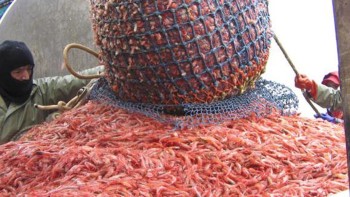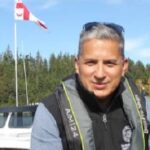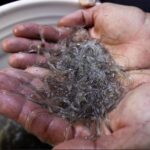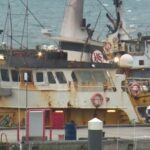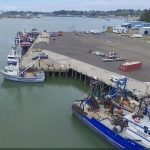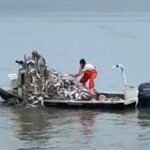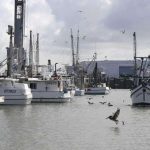Daily Archives: March 28, 2016
Sitka tribe asks state regulators to shut down commercial herring fishery
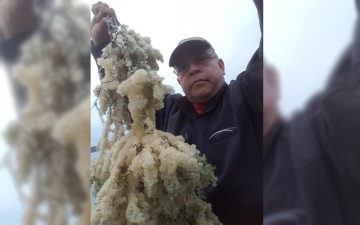 Sitka Tribe of Alaska is asking state fishing regulators to end the current commercial harvest of herring near the Southeast community, saying too many of the tiny fish are being caught and it’s hurting the tribe’s traditional reliance on herring eggs. Tribal chairman Mike Baines wrote a letter to Fish and Game Commissioner Sam Cotton today asking that he “cease any additional attempt” by the commercial fishing division to allow more herring to be caught in the Sitka sac roe herring fishery. A Fish and Game update on the Sitka Sound herring fishery on Saturday said approximately 10,050 tons had been harvested since this season started on March 17. That leaves about 4,690 tons left to be harvested. Read the rest here 19:06
Sitka Tribe of Alaska is asking state fishing regulators to end the current commercial harvest of herring near the Southeast community, saying too many of the tiny fish are being caught and it’s hurting the tribe’s traditional reliance on herring eggs. Tribal chairman Mike Baines wrote a letter to Fish and Game Commissioner Sam Cotton today asking that he “cease any additional attempt” by the commercial fishing division to allow more herring to be caught in the Sitka sac roe herring fishery. A Fish and Game update on the Sitka Sound herring fishery on Saturday said approximately 10,050 tons had been harvested since this season started on March 17. That leaves about 4,690 tons left to be harvested. Read the rest here 19:06
Aging oil rigs spark debate: removal or reef?
 Twenty-three rigs sit in federal waters off California’s coast, nearing the end of their life spans. BOEM expects them to soon stop producing oil — and, technically, federal leases require companies to completely remove decommissioned rigs. The California Marine Resources Legacy Act provides a loophole, allowing companies an exemption if there is a “net” environmental benefit to leaving the rigs as reefs. To proponents, the option is a win-win: The fish get to live, and companies will donate some of their significant savings to marine conservation. The debate often centers on a scientific question: Do rigs provide beneficial habitat, or do they just attract marine life passing through? Read the rest here 16:54
Twenty-three rigs sit in federal waters off California’s coast, nearing the end of their life spans. BOEM expects them to soon stop producing oil — and, technically, federal leases require companies to completely remove decommissioned rigs. The California Marine Resources Legacy Act provides a loophole, allowing companies an exemption if there is a “net” environmental benefit to leaving the rigs as reefs. To proponents, the option is a win-win: The fish get to live, and companies will donate some of their significant savings to marine conservation. The debate often centers on a scientific question: Do rigs provide beneficial habitat, or do they just attract marine life passing through? Read the rest here 16:54
Cooking Carlos in Canada while Boris Worm wants surveillance for all!
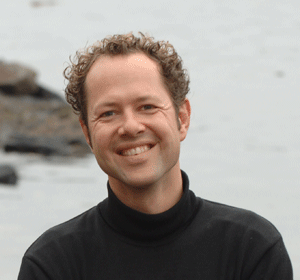 Carlos Rafael posted a $1-million bond earlier this month to get out of jail and now he’s back in the fish business. Rafael’s a New England seafood legend whose life story reads like a movie script. His cautionary tale also helps explain why Dalhousie University scientist Boris Worm wants fishing vessels to be tracked more closely. But I’ll get back to that later. Rafael, born 63 years ago in Portugal’s Azorean Islands, is a legend in the New England fishing industry. He owns more than 40 vessels and has been described in U.S. media reports as a “pillar” of the seafood industry in New Bedford, Mass. Rafael’s defence team says he’s a good guy. He helped his mom and dad fix their home on the island of Corvo. He hosts an annual island fundraising meal for orphans — and for widows too, I’m sure. Read the rest here 13:30
Carlos Rafael posted a $1-million bond earlier this month to get out of jail and now he’s back in the fish business. Rafael’s a New England seafood legend whose life story reads like a movie script. His cautionary tale also helps explain why Dalhousie University scientist Boris Worm wants fishing vessels to be tracked more closely. But I’ll get back to that later. Rafael, born 63 years ago in Portugal’s Azorean Islands, is a legend in the New England fishing industry. He owns more than 40 vessels and has been described in U.S. media reports as a “pillar” of the seafood industry in New Bedford, Mass. Rafael’s defence team says he’s a good guy. He helped his mom and dad fix their home on the island of Corvo. He hosts an annual island fundraising meal for orphans — and for widows too, I’m sure. Read the rest here 13:30
Silver Bay Seafoods in American Samoa to recruit for their Summer Seafood Processing
 About 200 job seekers turned up at the Tradewinds Saturday to learn about job opportunities offered by Silver Bay Seafoods in Alaska, an integrated processor of frozen salmon for domestic and export markets. Two company reps are in the territory to recruit for their Summer Seafood Processing. Most of those who turned up were young people, several of whom are currently working at the canneries. Silver Bay Seafoods is looking for manpower from anywhere it can and has extended job offers to non-US states and foreign countries using special immigration provisions. Link 11:19
About 200 job seekers turned up at the Tradewinds Saturday to learn about job opportunities offered by Silver Bay Seafoods in Alaska, an integrated processor of frozen salmon for domestic and export markets. Two company reps are in the territory to recruit for their Summer Seafood Processing. Most of those who turned up were young people, several of whom are currently working at the canneries. Silver Bay Seafoods is looking for manpower from anywhere it can and has extended job offers to non-US states and foreign countries using special immigration provisions. Link 11:19
United Nations negotiations begin today in New York to rescue ocean life
 It took a decade to get to the negotiating table, and it could easily take another to finish the job, but UN talks in New York to safeguard life in the high seas finally begin in earnest Monday. The stakes could hardly be higher, experts and diplomats agree. Oceans produce half the oxygen we breathe, regulate the weather, and provide humanity’s single largest source of protein. Without them, Earth would be just another barren rock in the Universe. And yet humanity has harvested marine species upon which we depend to the edge of extinction, and used the seas as a collective garbage dump. Climate change, meanwhile, has altered the ocean’s basic chemistry in ways that raise the specter of a mass extinction that scientists say is already underway. Read the rest here 10:24
It took a decade to get to the negotiating table, and it could easily take another to finish the job, but UN talks in New York to safeguard life in the high seas finally begin in earnest Monday. The stakes could hardly be higher, experts and diplomats agree. Oceans produce half the oxygen we breathe, regulate the weather, and provide humanity’s single largest source of protein. Without them, Earth would be just another barren rock in the Universe. And yet humanity has harvested marine species upon which we depend to the edge of extinction, and used the seas as a collective garbage dump. Climate change, meanwhile, has altered the ocean’s basic chemistry in ways that raise the specter of a mass extinction that scientists say is already underway. Read the rest here 10:24
Fishermen hold Science hostage, demand $45,000 in ransom claim the Feds
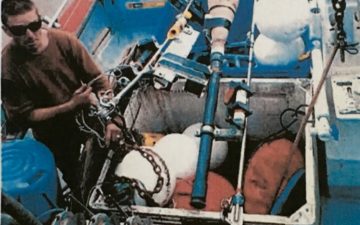 Two fishermen who found a piece of scientific equipment off the coast of Monterey are holding it hostage, interfering with international research, and demanding $45,000 ransom for its return, the federal government claims in court. The United States sued Daniel Sherer, Patrick Anderson and their business, A&S Fisheries, in Federal Court on Friday, accusing them of holding government property “de facto hostage” and causing irreparable harm to an international research project. The “oceanographic mooring buoy,” known as Scientific Mooring MS1, was one of several anchored to the seafloor to record data on the velocity, temperature, salinity and sediment concentration of ocean currents. Read the rest here 08:00
Two fishermen who found a piece of scientific equipment off the coast of Monterey are holding it hostage, interfering with international research, and demanding $45,000 ransom for its return, the federal government claims in court. The United States sued Daniel Sherer, Patrick Anderson and their business, A&S Fisheries, in Federal Court on Friday, accusing them of holding government property “de facto hostage” and causing irreparable harm to an international research project. The “oceanographic mooring buoy,” known as Scientific Mooring MS1, was one of several anchored to the seafloor to record data on the velocity, temperature, salinity and sediment concentration of ocean currents. Read the rest here 08:00






